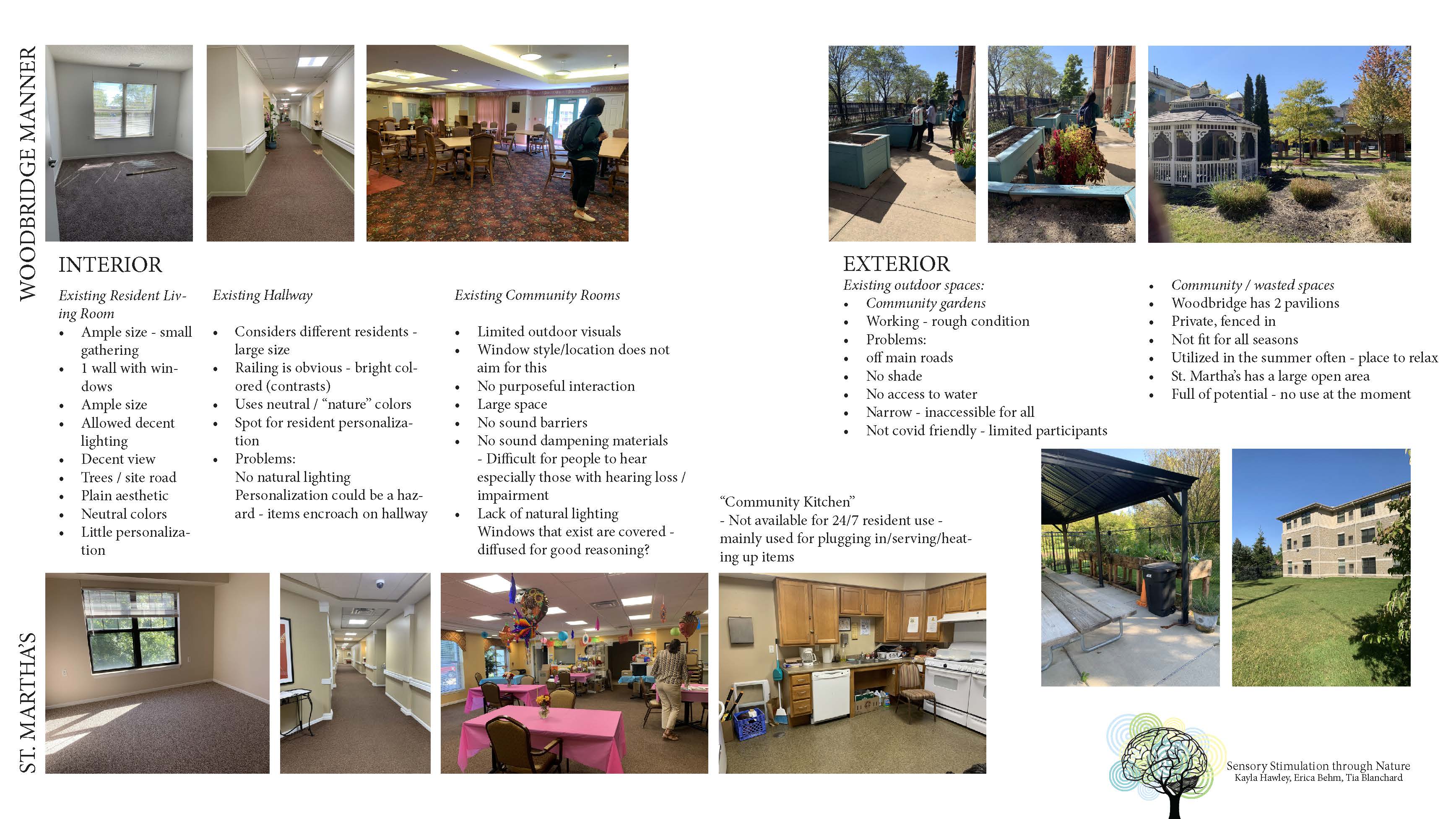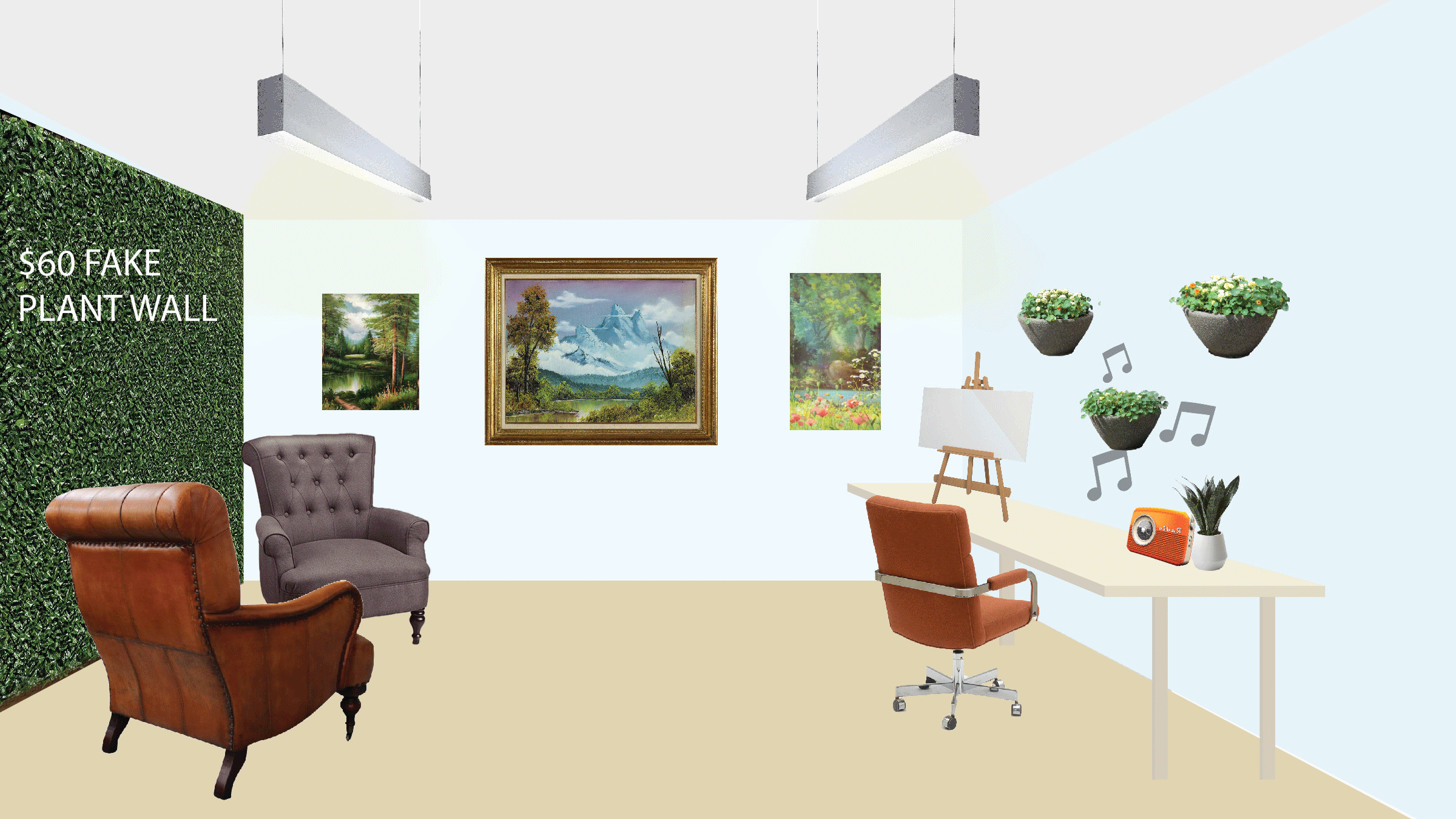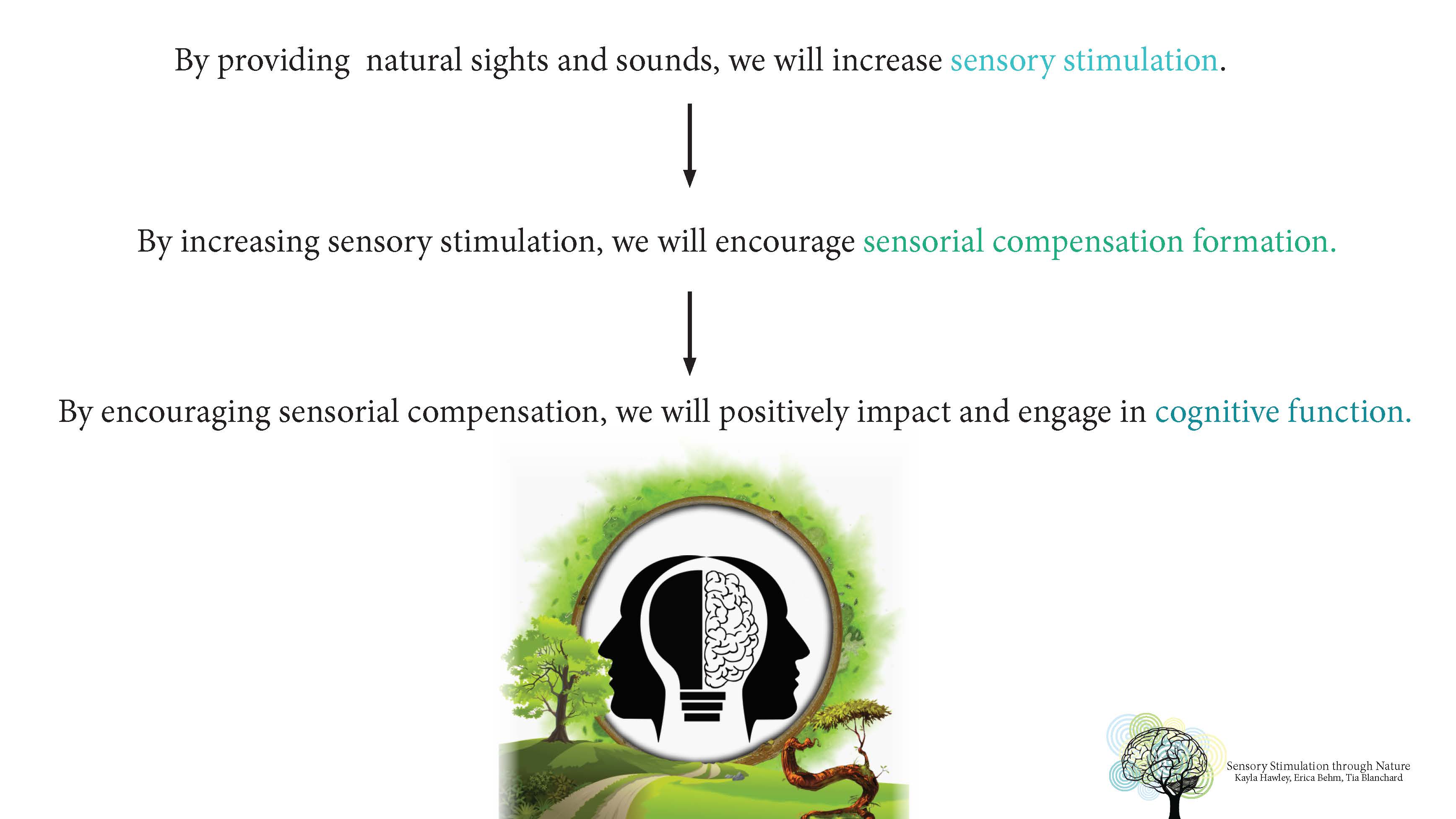︎ Sensory Stimulation Through Nature
How can nature create positive stimulation and spaces for social interaction for aging adults?
By Kayla Hawley ︎ , Erica Behm ︎ , Tia Blanchard ︎

Why
Adults over 50 are especially vulnerable to mental illnesses and cognitive decline. The environment they live in can heavily impact this, along with outside sources such as financial stress. Often minority groups with low income end up living in highly urbanized areas where access to nature is either difficult or non-existent. This lacks outlets for stress, reduces sensory stimulation, and aids in cognitive decline.
How can an architectural environment create positive, stress-free spaces that promote sensory stimulation in aging adults through nature based interventions?
By focusing on sensory stimulation, healthy aging, and cognitive function, implementing natural elements will provide a safe space for enjoyment, encourage cognitive engagement and sensory use, reduce risk of depressive symptoms, promote intergenerational interaction, and provide ‘meaning of purpose’ tasks.

Noticable decline begins at or after the age of 50 for the average human being. This chart shows a relative decline starting at this known point and following guidelines of which senses tend to have higher loss. (Graphic by Kayla Hawley)
Hypothesis
If we stimulate senses through nature, then aging adults will have decreased degradation of senses, improved cognition, and reduced stress.

Nature -> Brain <- Senses
Through recent research we have found that natural elements affect the brain through sensory stimulation. The diagram shown above provides examples of nature elements and the senses they may stimulate. For example, water elements such as rain or waterfalls allow the sense of smell and taste to be stimulated as well as providing a sense of touch and soothing sounds to affect auditory. (Graphic by Tia Blanchard)

(Graphic by Tia Blanchard, Erica Behm)
How
Through researching sensory degradation, compensation, and stimulation, we can assess the background in sensthetics. Combined with research on nature and its impacts on mental health and aging, we can develop interventions implemented over various lengths of time that promote positive sensory stimulation through nature.
 Site Visit Analysis (Graphic by Kayla Hawley, Erica Behm)
Site Visit Analysis (Graphic by Kayla Hawley, Erica Behm)What
Our project goal is to create a mini sensory ecosystem that promotes stimulation and socialization. To encourage sensory use and compensation elements of nature will be implemented within the residents’ environment. These spaces will be focusing on sensory use and sensory compensation development in those that have sensory loss.

_Sensory Room_Intervention 1

(Graphics by Erica Behm)
_Sensory Based Products_Intervention 2

(Graphics by Tia Blanchard)
_Horticulture Therapry_Intervention 3

(Graphics by Kayla Hawley)
Design To Outcomes
Our design proposal will create a healthy, safe social environment for residents to enjoy, relax, and experience sensory stimulation through natural elements. Through the incorporation of nature, both inside and outside, we will increase stimulation; this will encourage sensory compensation and positively impact cognitive function. Additionally, interactions with nature, other residents, and family will reduce levels of stress while creating positive thoughts, reactions, experiences, and task-driven activities.
So What
Nature based sensory interventions create stress free enriching environments that can be invested and implemented on multiple scales by operators and builders. This stimulation is important to engage cognitive function among seniors who may be struggling with sensory decline.

(Graphic by Erica Behm)
Links to Follow:
︎︎︎Two Page Report
︎︎︎Miro Board
︎
Works Cited
2. Aging, Institute on. “Birdwatching Helps Older Adults Reconnect with Nature and Their Health.” IOA Blog, June 8, 2016. https://blog.ioaging.org/activities-wellness/birdwatching-helps-older-adults-reconnect-nature-health/.
3. “Brain Health: Boost Your Brain with Gardening.” Aging Outreach Services, June 1, 2020. https://agingoutreachservices.com/advice/health-wellness/brain-health-boost-your-brain-with-gardening/.
4. “Cognitive Health and Older Adults.” National Institute on Aging. U.S. Department of Health and Human Services. Accessed December 6, 2021. https://www.nia.nih.gov/health/cognitive-health-and-older-adults.
5. “Enhancing Vision through Touch.” National Federation of the Blind . Accessed December 6, 2021. https://nfb.org/images/nfb/publications/books/integrating-print-braille/integratingprintandbraillechapter3.html.
6. Humes, Larry E, and Levi A Young. “Sensory-Cognitive Interactions in Older Adults.” Ear and hearing. U.S. National Library of Medicine, 2016. https://www.ncbi.nlm.nih.gov/pmc/articles/PMC4930008/.
7. Jpanayotov. “Sensory Stimulation Activities for Seniors with Dementia.” Assisting Hands , November 25, 2020. https://assistinghands.com/20/illinois/hinsdale/blog/sensory-stimulation-activities-for-seniors-with-dementia/.
8. L, Chinnery Holly, and Thompson Simon BN. “Sensory Compensation in Children Following Vision Loss after Trauma and Disease.” Journal of Clinical Research and Ophthalmology. Peertechz, September 23, 2015. https://www.peertechzpublications.com/Clinical-Research-Ophthalmology/JCRO-2-121.php.
9. Nanda, Upali., Hoelting, Melissa., Soja, Rebecca., Nautiyal, Divya., Warner, Grant. “Enriched Environments for Brain Health that Foster Creativity, Promote Positivity, and Reduce Stress: A Neurogenesis Hypothesis” HKS. June 1, 2021. https://www.hksinc.com/how-we-think/research/enriched-environments-for-brain-health-that-foster-creativity-promote-positivity-and-reduce-stress-a-neurogenesis-hypothesis/
10. Tompa , Dr. Rachel. “The Plastic Fantastic Brain: Why Losing One Sense Rewires Others.” Fred Hutch, January 19, 2016. https://www.fredhutch.org/en/news/center-news/2016/01/losing-senses-rewires-others-study.html.
11. V;, Wettstein M;Wahl HW;Heyl. “Visual Acuity and Cognition in Older Adults with and without Hearing Loss: Evidence for Late-Life Sensory Compensation?” Ear and hearing. U.S. National Library of Medicine. Accessed December 6, 2021. https://pubmed.ncbi.nlm.nih.gov/29256920/.
12. Walsh, Fiona E ; Walsh, Greg S ; Eyre, Harris A ; Dawson, Walter D. “Late-Life Brain Health Architecture: Leveraging Convergence Science Principles.” The American Journal of Geriatric Psychiatry. Washington: Elsevier Inc, n.d. doi:10.1016/j.jagp.2020.05.003.
13. “Why Bird-Watching Can Be Healthy for Seniors.” Medicareful Living. Ritter Insurance Marketing. Accessed December 6, 2021. https://living.medicareful.com/why-bird-watching-can-be-healthy-for-seniors.